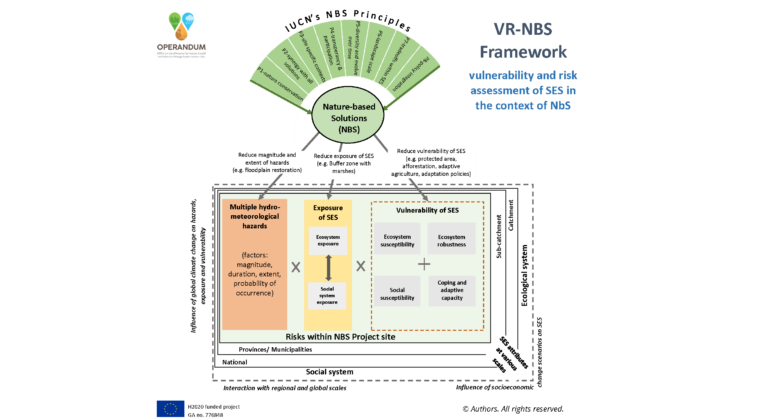Result description
Nature-based solutions (NBS) are increasingly being implemented as suitable approaches for reducing vulnerability and risk of social-ecological systems (SES) to hydro-meteorological hazards. Understanding vulnerability and risk of SES is crucial in order to design and implement NBS projects optimally. A systematic literature review confirms that very few vulnerability and risk assessment frameworks have been developed in the context of NBS. Most of the frameworks have emphasised social systems over ecological systems. Furthermore, they have not explicitly considered the temporal dimension of risk reduction measures. The study proposes an indicator-based vulnerability and risk assessment framework in the context of NBS (VR-NBS) that addresses both limitations. The framework aims to allow for a better consideration of the multiple benefits afforded by NBS. A list of 135 indicators, representing the social and the ecological sub-systems, is identified through literature review and surveys in NBS project sites. The list will act as a reference indicator library in the context of NBS projects and will be regularly updated as lessons are learnt.
Addressing target audiences and expressing needs
- Collaboration
Our target audience is broad, including scientists, experts in NBS implementation, civil society representatives and government agencies from the local to the national level. The framework was developed with a broad range of stakeholders, but we are particularly interested to have feedback/discussion from/with civil society representatives and government organizations.
- Research and Technology Organisations
- Academia/ Universities
R&D, Technology and Innovation aspects
This framework reflects the interlinkages between ecosystem and social system as well as the effects of multi-hazards and risks at various spatial scales. The proposed conceptual framework will be operationalized with indicator-based approaches for vulnerability and risk assessment in the OPERANDUM project Open-Air Laboratories (OAL).
Result submitted to Horizon Results Platform by ALMA MATER STUDIORUM – UNIVERSITA DI BOLOGNA

